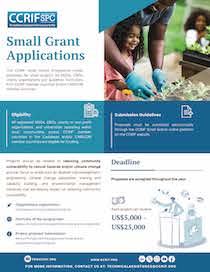Grand Cayman, 18 December 2024. The Government of Belize received a payment of US$805,794 under one of CCRIF SPC’s recently introduced policy endorsements known as the Wet Season Trigger. Over the period November 16-18, the coastal area of northern Belize experienced rainfall associated with Tropical Cyclone Sara, which occurred after a period of rainfall significantly above the long-term average for this area. Although the rainfall event associated with TC Sara did not meet the specific conditions to trigger the country’s excess rainfall policy, the combination of the two circumstances – a particularly wet period that began on October 20 and the rainfall event during November 16-18 – triggered the Wet Season Trigger endorsement of Belize’s excess rainfall policy.
On receiving the payment from CCRIF, Minister of State in Belize’s Ministry of Finance, Hon. Christopher Coye, stated, “The Government of Belize welcomes the timely payout generated under the Wet Season Endorsement attached to the CCRIF Excess Rainfall policy resulting from the passage of Tropical Storm Sara. Our response to recovery efforts will certainly be supported by this disbursement”. All CCRIF payouts or policy endorsement payments are made within 14 days of an event.
In its 2023/24 policy year, CCRIF introduced three policy endorsements that are aimed at improving CCRIF’s ability to identify and provide coverage for events that occur under very specific conditions that may lead to some level of damage, but which would likely not trigger the main policy. These policy endorsements are:
For Excess Rainfall Policies:
- Wet season trigger (WST), which introduces the ability to provide coverage for excess rainfall events that occur when the soil is saturated due to previous rainy periods.
- Localized event trigger (LET) for extreme localized rainfall events.
For Tropical Cyclone Policies:
- Localized damage index (LDI) for tropical cyclone events where losses are highly concentrated in small sections of the country.
According to CCRIF CEO, Mr. Isaac Anthony, “These endorsements have been welcomed by our members, given the increasing frequency, intensity, and unpredictability of hydro-meteorological events they are experiencing, which are likely driven by the changing climate.” He indicated that the WST endorsement “has been meticulously engineered to identify excess rainfall occurrences during periods of soil saturation, a precursor to flooding and landslides, thereby addressing the augmented risk of infrastructure and community damage under such circumstances”.
The WST endorsement provides a predetermined payout for rainfall events occurring amidst already saturated soil conditions, effectively capturing the heightened risk of flooding and landslides.
Since the start of the 2024/25 policy year, which began on June 1, CCRIF has made 14 payouts totalling over US$122 million. These included payouts totalling US$84.5 million following Hurricane Beryl in July. Since its inception, CCRIF has made 78 payouts totalling almost US$400 million. Members have used payouts to meet their most pressing needs following a disaster – including providing food, shelter and medicine; repairing critical infrastructure such as buildings, roads, and bridges – and indeed making these structures more hazard resilient; and supporting key economic sectors such as agriculture and tourism to enable them to recover faster.
About CCRIF SPC:
CCRIF SPC is a segregated portfolio company, owned, operated, and registered in the Caribbean. It limits the financial impact of catastrophic hurricanes, earthquakes, and excess rainfall events to Caribbean and Central American governments by quickly providing short-term liquidity when a parametric insurance policy is triggered. It is the world’s first regional fund utilising parametric insurance, giving member governments the unique opportunity to purchase earthquake, hurricane and excess rainfall catastrophe coverage with lowest possible pricing. CCRIF offers parametric insurance policies to Caribbean and Central American governments for tropical cyclones, earthquakes, excess rainfall and fisheries and also to electric and water utility companies in the Caribbean. CCRIF was developed under the technical leadership of the World Bank and with a grant from the Government of Japan. It was capitalized through contributions to a Multi-Donor Trust Fund (MDTF) by the Government of Canada, the European Union, the World Bank, the governments of the UK and France, the Caribbean Development Bank and the governments of Ireland and Bermuda, as well as through membership fees paid by participating governments. In 2014, the Central America and Caribbean Catastrophe Risk Insurance Program (CACCRIP) MDTF was established by the World Bank to support the development of CCRIF SPC’s new products for current and potential members and facilitate the entry of Central American countries and additional Caribbean countries. The MDTF currently channels funds from various donors, including Canada, through Global Affairs Canada; the United States, through the Department of the Treasury; the European Union, through the European Commission, and Germany, through the Federal Ministry for Economic Cooperation and Development (BMZ) and KfW. Additional financing has been provided by the Caribbean Development Bank (CDB), with resources provided by Mexico; the Government of Ireland; and the European Union through its Regional Resilience Building Facility managed by the Global Facility for Disaster Reduction and Recovery (GFDRR) and the World Bank. In 2024, CCRIF received funding from CDB, through the Canada-CARICOM Climate Adaptation Fund, to enable seven CCRIF members to increase their coverage and make their national social protection systems more shock responsive.
#ccrifspc #belize #tropicalstormsara #rainfall #centralamerica #caribbean #payout #naturaldisaster #catastropheriskinsurance #disasterriskfinancing #parametricinsurance #climatechange #lossanddamage





